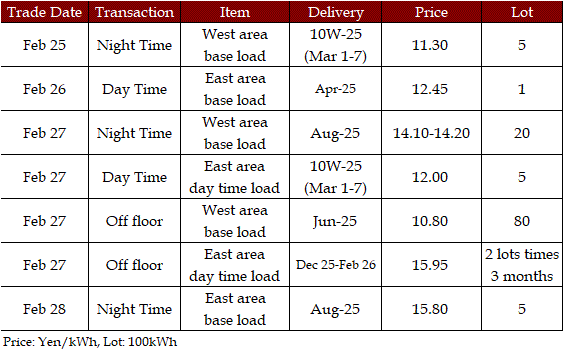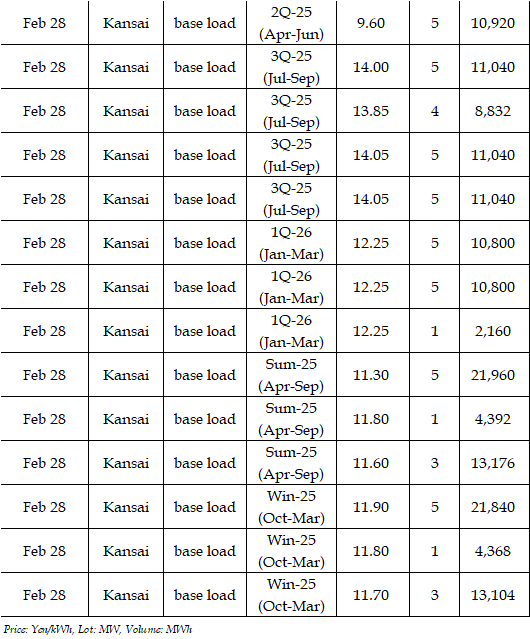|
In the day-ahead market on JEPX (Japan Electric Power Exchange), the 24-hour spot power prices on a weekly average basis for Feb 24-28 delivery fell back from the previous week in both East Japan (50Hz) and West Japan (60Hz). On top of a demand lull for a national holiday on Feb 24, heating demand slowed down as the temperatures stayed higher than normal in broad areas. The highest temperature in some parts of Kanto and further west exceeded 15 degrees, a level that is normally seen in late March. Thus, offers significantly outstripped bids throughout the week, generating downside pressure on spot prices. But most days during the week were cloudy in West Japan, and limited solar power supply frequently pegged day time prices in West Japan above those in East Japan
In Tokyo and Kansai, the key areas in East Japan and West Japan, the 24-hour average posted a difference in favor of the West by Yen 0.64 for Feb 24 delivery, Yen 2.19 for Feb 25 delivery, Yen 0.34 for Feb 26 delivery, and Yen 0.02 for Feb 28 delivery. On the other hand, Tokyo outperformed Kansai by Yen 0.34 for Feb 27 delivery.
The fuel market trends in the final week of February were detailed as follows.
DES Northeast Asia spot LNG prices stood at slightly below $13 per mmBtu for prompt April 2025 arrival as of Feb 27, falling sharply by about $1.50 from the end of the previous week (Feb 21). It was the first time to see the prompt contract slipping below the $13 mark since the middle of December last year. European natural gas prices declined steeply, and the LNG market in Northeast Asia followed suit. In Europe, slowing demand for stockpiling purposes weighed on the gas market amid a looming possibility that regulations for inventory building could be relaxed. The Ministry of Economy, Trade and Industry (METI) announced on Feb 26 that Japan's LNG inventories for power generation stood at 1.94 mil mt as of Feb 23, down 70,000mt from a week before. The figure was down from 2.18 mil mt that was the end-February level last year and also the average of past five years.
FOB Newcastle thermal coal prices in Australia stood in the mid $102 level per ton for February 2025 loading as of Feb 27. The level was down about 50cts from the end of the previous week. The weakness mirrored a decline in gas prices. On top of that, a source at a power producer and supplier said, "Demand itself is slowing down, and coal prices may fall below the $100 mark, or the breakeven point for producers."
In the crude oil market, WTI crude for April 2025 stood in the low $70 level per barrel as of the morning on Feb 28 while Brent crude for April 2025 was trading in the high $73 level. Both WTI and Brent were down about 50cts from the end of the previous week. Crude futures came under pressure from concerns over a recession in US and the outlook for growing crude oil supply from Russia. But US showed readiness to impose tariffs on Canada and Mexico on Mar 4 as planned. Expectations grew crude oil imports by US from both countries would shrink, limiting the loss in crude oil prices. Those two countries account for nearly 70% of total imports by US.
The actual highest price during the week was at Yen 40.00 in Chubu for Feb 25 delivery. Meanwhile, the actual lowest price during the week was at Yen 0.01 in Kyushu for Feb 24-27 delivery.
By area, the weekly average of the 24-hour spot prices was at Yen 12.54 in Hokkaido, down Yen 4.14 from the previous week, Yen 12.52 in Tohoku, down Yen 4.16, Yen 12.67 in Tokyo, down Yen 4.03, Yen 13.57 in Chubu, down Yen 3.18, Yen 13.25 in Hokuriku and Kansai, down Yen 2.98, Yen 13.25 in Chugoku, down Yen 2.81, Yen 13.06 in Shikoku, up Yen 2.79, and Yen 11.93 in Kyushu, down Yen 1.39.
In the JEPX auction, volumes of offers were 1,397.64 mil kWh on a weekly average basis, up a whopping 13.3% from the previous week. Meanwhile, bids on a weekly average basis shrank by 8.2% to 1,048.43 mil kWh. The weekly average of trade volumes waned by 0.8% to 843.21 mil kWh.
Power demand in nine areas of Japan during Feb 24-28 was a combined 13,094.53 mil kWh, down 8.5% from 14,309.37 mil kWh during Feb 17-21. The figure was down 0.4% from the corresponding period a year earlier. Demand during Feb 26-Mar 1, 2024 after day of week adjustment was 13,147.69 mil kWh.
Deals reported on TOCOM (Tokyo Commodity Exchange) during Feb 24-28 were as below.

Deals reported on EEX (European Energy Exchange) during Feb 24-28 were as below.











In the first week of March, spot prices are likely to rise from the final week of February. Spot prices will find support from lower reserve rates, with an increasing number of thermal units scheduled to suspend operation mainly for regular maintenance. On top of that, the weather is forecast to be cloudy across Japan until the middle of the week, leaving little scope for photovoltaic generation. On Mar 4, the temperatures are forecast to drop sharply from Kinki to Kanto, so that a return of chilly winter climate is believed to boost heating demand and help push up spot prices. Meanwhile, the weather will recover toward the weekend, and growing solar power supply is expected to weigh on day time prices. Still, the temperatures will remain relatively low in most areas, a factor that is likely to push the price gap wider between midday and evening hours. A source at a power producer and supplier said, "I suspect the 24-hour average in the first week of March will hover in the range of Yen 13-15 in both East Japan and West Japan. But Shikoku and Kyushu will be Yen 2-3 lower than that with a negative impact from solar power supply."
|
JEPX: System Price (Day Ahead 24 hours)
|
|
Weekday Price
|
24-Feb
|
25-Feb
|
26-Feb
|
27-Feb
|
28-Feb
|
|
24-Hour Ave
|
14.27
|
13.91
|
11.41
|
11.46
|
12.10
|
|
Volume (MWh)
|
801,283
|
863,502
|
854,623
|
859,426
|
837,206
|
|
(unit: yen per kWh) (date: delivery day)
|
|
|

|